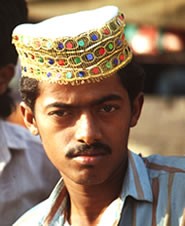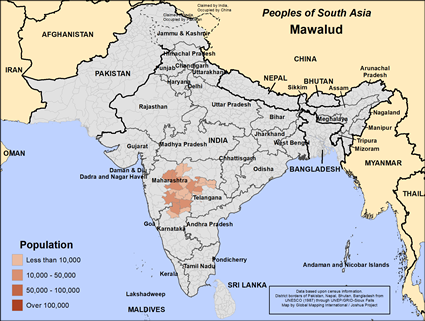Beginning in the 1100s, Muslim rulers conquered most of northern India. They then moved southward to subdue the Deccan Plateau, a region that was populated by many Dravidian- Muslims.
A distinct Islamic culture developed in the Deccan region, and it became the greatest center of Arabic learning in India until the Moghul conquest of 1687. In 1724, the Deccani regained power and became princely rulers. However, in 1948, when India declared its independence, they were forced under Hindu rule. Many emigrated to Pakistan; those who remained are now a minority group of Muslims.
Many Muslim peoples live in India's Deccan region. One of these is the Mawalud. The Mawalud people live on the so-called tableland of central India, between the Godavari and Manjra Rivers. They are primarily concentrated in central Maharashtra State and in the arid Deccan Plateau. They also live in major cities such as Hyderabad in Andhra Pradesh as well as various rural areas.
When the government of India ended Muslim rule, the Mawalud were converted from princely rulers, military officers, and wealthy landowners to blacksmiths, shopkeepers and carpenters. Muslim professionals adjusted more easily, entering banking, business, and employment as scientists and teachers. The former servants of the established Muslim government and nobility are now living on small pensions or the meager incomes of family members.
In the countryside, Mawalud culture embraces a mixture of Hindu and Muslim elements. However, much bitterness remains, due to the loss of their former glory. The educated urban population, which consists of only one-quarter of the Mawalud, lives a more secular modern life and has very little in common with the conservative urban Muslim community and religious leaders.
The social lives of the Mawalud center around their local religious community and immediate families. Groups usually cluster around their own local mosques. Intermarriage is rare between Muslim castes. Their society is patriarchal, which means that the fathers have absolute authority in the homes. Most women wear veils while in public. Each home contains small shrines in honor of their saints. The shrines are decorated with banners, flowers, and bright paintings of tigers.
Mawalud people honor learning and place a great emphasis on the arts. Painting is their specialty, especially the beautiful illustrations in poetry books. There are numerous art schools spread throughout the area of the Deccani. Some of these schools were begun as early as the 1500s by the migrating Muslims who were influenced by the famous Persian art.
Virtually all of the Mawalud are devout Muslims. They worship, play instruments, and sing at the ancient graves of their saints. Worship of saints is very common, and the extravagant decorations over their graves attract even the Hindus. As a whole, Islam in India include strong elements of mysticism.
Mawalud Muslims have been challenged in their religious beliefs by the Dravidians and various other Muslim sects that migrated into the Deccan Plateau long ago. Their religion, language, and ethnic recognition were belittled and discriminated against by the new Hindu Indian government. As a result, they have seemingly lost a vitality for Islam. It is no longer a spiritual lifestyle to them but is more a part of their identity as a people.
Deprived of their former sources of wealth and power, many Mawalud have given way to deep destitution and despair. They have struggled long and hard to maintain their culture, beliefs and pride. They need encouragement and hope, which can only be realized through a clear understanding of their relationship with the Lord of lords. Since Muslims revere holy scriptures, the Bible can be a possible opening.
Ask the Lord to call people who are willing to go to India and share Christ with the Mawalud.
Pray that the Holy Spirit will open the hearts and minds of the people to a clear understanding of the gospel.
Ask the Holy Spirit to soften the hearts of the Mawalud toward Christians so that they will be receptive to the gospel.
Pray that God will raise up teams of intercessors who will faithfully stand in the gap for the Mawalud.
Ask the Lord to raise up strong local churches among the Mawalud.
Scripture Prayers for the Mawalud in India.
| Profile Source: Joshua Project |











